|
Orconomics by J. Zachary Pike does one of my favorite things in comic fantasy. It takes fantasy tropes and shows what kind of infrastructure it takes to make them work. All those aspects of fantasy that we accept as part of the genre, but wouldn’t possibly fly in a realistic setting can become hilarious when when there are accountants and bureaucrats making them possible.
In this case, capitalism comes to fantasyland. A sizeable chunk of the economy is the Hero industry. Professional heroes are part of a guild and assigned ranks (which are suspiciously like character levels), and they take out contracts for a cut of the treasure. They are also backed by a whole investment system. Bankers and investors take out stakes in each adventure, funding them for an expectation of a strong return when the quest is successful. Mixed in with the main action, we get behind-the-scenes glimpses of that side of the industry. “This hoard was projected to be valued at fifty thousand giltin, Mr. Snithe.” Snithe had clearly been expecting this line of questioning. “We had it assessed, Mr. Poldo. Sent a hoard adjuster out and everything.” “And?” “He never came back.” “And you didn’t see that as a problem?” “It’s usually a good sign, sir. The most deadly monsters have usually done the most pillaging, you see. So when a beast takes down a well-trained hoard adjustor, it’s generally expected to have more valuable loot.” There are two problems with this system. One, the “natural resource” of monster hoards has been drying up as the heroes over-hunt. Two, Shadowkin (golbins, orcs, etc) are integrating into society, which reduces the opportunities available for monsters to collect new hoards for heroes to reclaim. The system is unsustainable and the market is on the verge of collapse. The heroes aren’t exactly good people, either. They take a very mercenary attitude towards quests and loots, and the law gives them an excess of leeway when it comes to crimes committed while questing. It’s a corrupt system, and in some ways, the heroes are no more heroic than collections agents. This passage sums up the economy fairly well, in the aftermath of a heroic quest to slay some goblins on a farm. “I …” The farmer shook his head and stared out at his ravaged fields. The ground was littered with green corpses and ruined crops. “I thought the loot would pay your fee. Thought there’d be some left over for me, too. Heard that’s how a man can get rich nowadays. Find some foes, claim the contract, get a cut of the loot. Barten Mander had a griffin take his cow, and he bought hisself three acres with his cut of the hoard.” He turned back to the hero, his eyes filling with tears and futile rage. “And then you come in, you ruin my farm, you take all the food in my stores and you tell me that’s the loot! You rob me, give me half my stuff back, and charge me for it!” “No, the Goblins in your basement robbed you,” corrected the warrior. “We took it from them. That’s what loot is.” “It came from my house!” “Where else do you think loot comes from?” hollered the hero, finally losing patience with the old man. For most of the novel, this aspect is part of the setting and featured in interludes. The main plot revolves around Gorm, a grizzled, disgraced veteran hero as he is caught up in a new contract that stands to restore his place in the Guild. His job is to accompany Niln, an incompetent prophesied hero to reclaim some stolen Elven treasure (that was in turn stolen from Orcs) and determine who gets to keep it. They’re both the finders and the scapegoats, ensuring that the government can’t be held responsible for the controversial decision of handing over the treasure to the Elves or Orcs. They wander into a conspiracy from there. Gorm is a fascinating character. He reminds me a lot of Marvel’s Wolverine. He’s a Dwarf berserker and a bit of an anti-hero, quick to attack and vicious in a fight. He’s also a seasoned veteran and has a great deal of wisdom and experience when it comes to fighting and questing. He very quickly positions himself as the mentor and de facto leader of his team, while allowing Niln to take the spotlight. Like Wolverine, he is fiercely protective of the helpless and the innocent, including Gleebek, a goblin he took on as a squire in a rare act of mercy. Also like Wolverine, his gruff and barbaric demeanor masks a thoughtful and conflicted mind. Here’s him giving a pep talk. “Oh … that. Just survive. Live through enough quests, and you’ll rank up. For a strong heroine with your kind of magic, that’s the easy part. But if you do that long enough, eventually you learn that your job isn’t about being self-sufficient in the wild or defending the weak or the pursuit of justice. Really, we just kill things for money. And when that finally starts to sink in, you face the hard part of professional heroics: the big questions.” “The big questions?” “Yeah. Is there more to life than just killing and looting? Are we more than just numbers in some Guild Master’s ledger, statistics written on our license? And the big one, the one that haunts you every night on the job: Why are we doing this anyway?” Filling out the team, we have Gaist, a mute and intimidating weapons-master tied to Gorm’s shameful past; Kaitha, another fallen hero with a secret; Laruna and Jynn, bickering mages; and Heraldin, the bard who is definitely not a thief pretending to be a bard. The humor comes from the dysfunctional party dynamics (one of my favorite tropes), the absurdity of the setting that I dwelled on already, and the riffing on Dungeons and Dragons style questing (to the point that you could perhaps classify it as LitRPG-lite). We also see some direct satire of the 2008 Recession and the opioid crisis. It’s worth noting that the book is more front-loaded with humor. As is fairly common with Comic Fantasy, once we get toward the end, the book raises the stakes and adds drama in a way that doesn’t leave much space for jokes. This is also the first book in a series, and while it’s a complete story, the world is left in a very interesting state by the end and is clearly setting up for the sequel. Orconomics gets a full recommendation from me. Full Disclosure: Pike and I are both members of The Independent Guild of Fools, a loose association of comic fantasy authors. His membership did not affect my opinion of his book; rather, my opinion of his book affected the outcome of his petition to join.
2 Comments
Carpet Diem by Justin Lee Anderson is the story of Simon Debovar, a rich shut-in with an allergy to human contact (other than his drunk, lecherous Great Aunt Harriet) who gets drawn into a celestial competition between God and Satan that stands to usher in the end-times. He owns a very important rug, you see, and an angel and a demon show up at his house demanding that he choose which side gets it. The rug is stolen by a third party, and things spiral from there. The book uses a lot of elements you’d expect from the thriller genre, with many competing factions with murky and secret motives that are slowly revealed. As one character says, “Those who help you are not always your friends; those who oppose you are not always your enemies.”
This is an urban fantasy drawing from Christianity, but I wouldn’t call this a religious book, nor is religion used as the butt of jokes. Rather, it treats Christian elements as mythology and makes them its own with a little sass and parody to go around. I bring it up because using a real-world religion as the basis of a book’s mythos can be a touchy subject and it’s important to note that “Carpet Diem” takes a pretty neutral approach to the religion. It’s kind of like the movie Dogma in that respect, but with even less attention paid to the actual religion. Anyway, the book takes a fairly low-brow approach to humor. This is a book about drunk, horny people blundering their way through a world-saving adventure. Simon’s aversion to humanity and social awkwardness is a major source of humor, as is his instinct to assume that implausible worst about everyone he meets (such as jumping to the conclusion that the angel and demon who visit him at the beginning are planning to capture him and sell him into slavery based on absolutely no evidence). Aunt Harriet is a sexual wrecking ball. The ancient feud between pirates and ninjas even makes an appearance. Normally, I like to post a few choice quotes in these reviews to better demonstrate the style of humor. I failed you this time, and here’s why: The prose and humor in this book are incredibly smooth. The book just flows and builds on itself in a way that you can’t just pick out a funny sentence or paragraph. I was about 8% through the book before I even remembered I was supposed to be highlighting things, but everything is just so dependent on context that it’s hard to just throw some quotes at you. My advice is to read the first two chapters and see for yourself. If you want to see what happens when you cross “Dogma” with “The Big Lebowski,” or just need some comic urban fantasy in your life, give this one a read. One of the staples of the fantasy genre is the unlikely hero. In comic fantasy, this hyperbolically becomes the implausible hero. “Here Be Dragons” by David Macpherson stars Orus, an old, fat, retired adventurer who changed careers to King’s gardener after impregnating a the first princess he ever rescued.
‘Oh yes,’ replied Mavis, moving in for the kiss. ‘It can’t happen the first time. Everyone knows that.’ Unbeknown to him at that magical moment, Orus was about to learn one of life’s most valuable lessons: virgins should not take safe sex advice from other virgins. Nine months later he would also learn that being a wandering adventurer didn’t bring in the steady income required for supporting a new family." He’s a hoarder with a man-chest full of regrets, and takes up a quest to save the last dragon because hey, why not? "Dreams weren’t for people like him. They were for princes and kings, knights and wizards. Dreams were there to push along children until they reached the point in their lives where it was too far to turn back, where joy in what you had was replaced by frustrated desire for what you didn’t. For people like him, dreams were there to break you." He’s being pursued by an alliance of vain, cruel, self-aggrandizing nominal heroes who want the honor of killing the last dragon. As you can imagine, this book takes joy in trope subversions. That’s where a lot of the humor comes from, combined with the hectic, slapstick action that comes from implausible heroes barely scraping by. We also have some delightful descriptions and analogies. "The other visitor to Orus’s room still stood in the doorway, a bit like a man watching a husband and wife argue and trying to pick the best moment to explain his jacket was on the back of one of their chairs." However, I’m sorry to say that this book left me feeling kind of lukewarm. It mostly succeeds as a comedy, but what it did right just wasn’t quite enough for me. My biggest complaint was actually the writing itself. There was a lot of flat prose, whereas comedy writing benefits from a bit of jauntiness. The prose was often awkward and labored, and stingy with the commas. Around once per chapter, the point of view changed without warning, which got disorienting. These things hurt the comic timing and delivery. It’s a death sentence for a joke when the reader needs to take a moment to parse out the face-value meaning of a paragraph. This was an inconsistent book for me. When it worked, it worked well. I particularly enjoyed the occasional chapter telling a side-story from a one-off POV. While I can’t give this one an enthusiastic endorsement, it’s worth downloading the sample and checking it out for yourself. The first few chapters are pretty indicative of what the rest of the book will be like. I received a review copy of this book from the publisher. Panic in the Old Country by Sam Hooker will be released on June 5, 2018.
I’ve read that a good way to set up a story is to establish what a character is good at and make him do something else. Peril In the Old Country by Sam Hooker uses that method with malicious glee. Sloot Peril’s chief skills are accounting and flying under the radar are of a capricious and murderous government ruled by the tyrannical Domnitor, long may he reign. Sloot is a nervous, cowardly man adept in navigating a Kafkaesque dystopia that reads like a combination of 1984, Papers Please, and Paranoia. He’s stricken by learned anxiety and alternates between resigned fatalism and undignified panic. The humor is almost entirely driven by Hooker’s knack for describing how impossibly bleak and abusive the setting is, along with Sloot’s complete inability to cope. In the early chapters, Sloot recieves an unfortunate promotion that places him in a new job as the financier of Lord Wilhelm “Willie” Hapsgalt, a foppish man-child of a noble who has been six years old for the past 36 years (He has a birthday coming up. He’s going to turn six.). This sparks a long series of fresh tortures for Sloot, from having to stand up to his own employees to visiting the Old Country’s hated neighbor Carpathia, a land of astoundingly violent and dangerous savages (if you believe the Ministry of Propaganda, and it’s inadvisable not to). He doesn’t even allow himself the space to question the insanity and injustice of his world, and it’s strangely endearing to watch him struggle along in a world where even wearing the wrong shoes to stand in line can earn you a roughing up and swear words summon goblins. It’s also a spy story. Early on, Sloot is recruited, much to his chagrin, by a spymaster named Roman and is caught in a criss-crossed web of conspiracies, which brings him no end of stress. This is comedic fantasy starring a craven protagonist, so the comparisons to Discworld’s Rincewind are inevitable, but I would argue that this book reads more like a parody of Robin Hobb’s Assassin’s Apprentice. Like Fitz, Sloot is just a man trying to get by in a crapsack world and find a little happiness while suffering through an endless parade of torment. Roman is a smarmier, more secretive Chade who delights in Sloot’s ignorance. Lord Wilhelm is as foppish and hedonistic Prince Regal, minus the villainy. There’s even a painfully awkward romance that Sloot can’t help but undermine with his cowardice and awkwardness. If you’re a fan of books that treat their protagonists like chew toys at a doggie daycare, “Panic in the Old Country” is the parody for you. I had two major complaints about this book. First, Hooker describes a culture of kilt-wearing, red-bearded barbarians known for their love of **whiskey** (He spelled whisky with an [e]! Get him!). Second, I found the ending abrupt and unsatisfying. I don’t want to say more for fear of spoilers. Hooker never misses a beat when it comes to describing the terrors and abuses of his world. For my comedy reviews, I like to pick a few particularly funny quotes from the early chapters to give an impression of the sense of humor while avoiding spoilers. In “Peril in the Old Country,” however, Hooker was on fire from the start and I had trouble deciding on which quotes to pick just from Chapter 1. The first chapter really sets the tone and establishes Sloot, the setting, and the sense of humor nicely. "It looked into another apartment within arm’s reach, which was occupied by a man who looked remarkably like Sloot. Curtains might have provided them both some amount of privacy, though they’d also have robbed them both of any natural light that managed to elbow its way between the two buildings on occasion, and into their respective apartments. Their unspoken compromise was just to ignore each other, hence no name is available to give for this neighbor, who will probably never be mentioned again." *** "While he was still in school, when the class had finished the recitation, the teachers had the children turn and slap each other across the face so they wouldn’t forget. Sloot had never been sure what he was supposed to do about it now that he did his recitation on his own, so he slapped himself just to be on the safe side. He reasoned that he was far too old not to know, and didn’t want to slip up if anyone were watching. Sloot had spent his life up to that point nurturing an utter dearth of “self-confidence,” a term he believed had been invented by guidance counselors who truly enjoyed lying to people. In any case, the slapping seemed to be working. He was nearly forty, and heresy had yet to creep into his mind." *** Vasily’s work was consistently abysmal, so it was reported to his father—a very affluent shareholder in the Three Bells—that his son’s work was nothing if not consistent. Unidentified Funny Objects 6 is last year’s edition of an annual anthology of humorous science fiction and fantasy shorts, edited by Alex Shvartsman. There are 20 stories in this one, so prepare for rapid-fire overviews with a brief touch on the comic stylings. This won’t be a thorough review, but I bolded my personal five favorites.
Game of Goblins by Jim C Hine
The Breakdown of the Parasite/Host Relationship by Paul R. Hardy
From This She Makes a Living? by Esther Friesner
Twenty-Nine Responses to Inquiries About My Craiglist Post: Alien Spaceship For Sale. $200, You Haul. by Tina Connolly
Tyler the Snot Elemental Scours the Newspaper, Searching for Change by Zach Shephard
Agent of Chaos by Jack Campbell
Display of Affection by P. J. Sambeaux
The Great Manhattan Eat-Off by Mike Resnick
An Evil Opportunity Employer by Lawrence Watt-Evans
Common Scents by Jody Lynn Nye
A Mountain Man and a Cat Walk Into a Bar… by Alan Foster
Lost and Found by Laura Resnik
A Crawlspace Full of Prizes by Bill Ferris
Return to Sender by Melissa Mead
The Friendly Necromancer by Rod M. Santos
An Open Letter to the Sentient AI Who Has Announced His Intention to Take Over the Earth by Ken Liu
Approved Expense by David Vierling
Alexander Outland: Space Jockey, An Alexander Outland Series Short by Gina Koch, Writing as G.J. Koch
Dear Joyce by Langley Hyde
Impress Me, Then We’ll Talk About the Money by Tatiana Ivanova (Translated by Alex Schvartsman)
Overall, this was a really fun anthology and it was tough to pick a top five. Only a few of the stories were misses for me. I definitely recommend a read, and this one is great to have in your back pocket for a time when you only have a few minutes to read something and want to knock out something quick, light, and entertaining. Trench: A Fantasy Novel of Epic Inconsequence by Ethan Childress is a series of vignettes about a group of soldiers trying to get by in the fringes of the Thoussand Years War. The origins of the war are hilariously explored in the prologue--basically, humans, dwarves, and elves teamed up against the trolls, goblins, and orcs and please let’s not dwell on who ate who first. The war has been going on for a thousand years and shows no signs of ever ending, which leaves our band of soldiers living in the trenches well outside any sort of civilization. They have no hope of ever going home, so they just try to take care of each other and make it until the next regularly-scheduled sneak attack. One day they’re trying to sneak a hungover goblin across The Grinder (think No Man’s Land) without breaking a holiday ceasefire. One day they’re trying to impress dignitaries from an inbred, stupid, bigoted and more importantly wealthy and generous family in order to keep the shipments of mutton coming. Of course, it’s still a war story so expect some loss and tragedy along the way. It’s basically M*A*S*H set in a fantasy-themed World War One.
Childress has a lot of fun with the setting and black humor flows out of it. Miller and his best friend Doug Treesinger gamble over which new recruit will foolishly get himself killed first. Fairies on the front turn feral because they’ve been trapped in a place bereft of beauty. Animals evolved to survive life on the trenches, such as crows who evolved to become evil and try to goad soldiers into the Grinder for a feast. Even the sentient races are affected. It was no great secret that the first people to rush onto the Grinder were going to die horribly, torn to pieces by the magical wards given dragon form. The real trick was deciding who would be the one to do it. Originally, it had been presented as a brave and noble sacrifice, a great honor of personal sacrifice given to only the most selfless and noble of soldiers. But, after the centuries of brave, noble, selfless soldiers being ripped limb from limb for no real gain, the traits had, by in large, been selectively bred out of the common soldier. But the real draw is the characters and their friendships. This is an ensemble cast and most characters have their moment to shine, but the protagonist is Sergeant Jeremy Miller, who is smarmy, jaded, lazy, irreverent, and drunk if he can help it. He is in charge of integrating a band of new recruits including the spunky tinker Brenda Kettleblack, Moregrave the famous arch-mage who got bored with civilian life, and Caleb Witchslayer, whose name matches his job title, a hyper-zealous religious fanatic who has no shortage of trouble fitting in with a more relaxed, pragmatic army--for instance, the witches who run the healing tent. "These are the symbols of my religions," Witchslayer answered defensively. "Plural?" asked the elf. "Well, yes," the young man said. "Each has important messages to give to us about the world we live in." "Such as?" pressed Miller. "Well, this one," Witchslayer indicated a small bent line in a circle, "tells us that we are to kill witches with fire. And this one," holding up something that looked like a star crossed with a heart, "tells us how to find witches using salt and holy earth. And this one…" It’s the character relationships that really sell this book and a great deal of the humor comes from good-natured pranks and banter. For example, Miller is locked in a will they or won’t they flirtation with his commanding officer, who never misses an opportunity to hit on him with a double entendre. Good thing his best friend Doug Treesinger has implemented what he calls The Great Prank to cockblock him. First, the elf had explained his "Great Prank." Brenda had zoned in and out of the explanation favoring to watch the elf's delicate lips moving deftly with the words and allowing her mind to drift as to what else they would be good at. But she got the general drift. The elf told them that their captain, Bozeman, had been making advances to their sergeant, Miller, for the better part of a year, and that every time she did Treesinger talked Miller out of it by explaining away the advance as nothing more than military double-speak. This had bothered her a little, but it seemed to make the elf happy, so if Miller couldn't figure "The Great Prank" out, that was on him. All in all, this book hit a lot of the right notes for me: a serious setting taken to comical extremes, character banter, and a lot of heart. Unfortunately, there was one major negative: This book needed another round of proofreading. All too often I caught questionable punctuation and use of the wrong homonyms, such as “gate” instead of “gait.” I highlighted about a dozen myself and I wasn’t exactly on the hunt. They were a distraction and don’t stop this book from being excellent. |
Review PolicyArchives
August 2018
Categories |

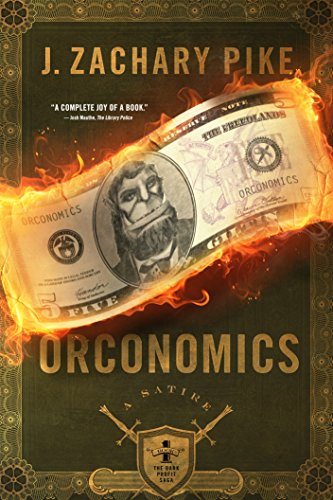
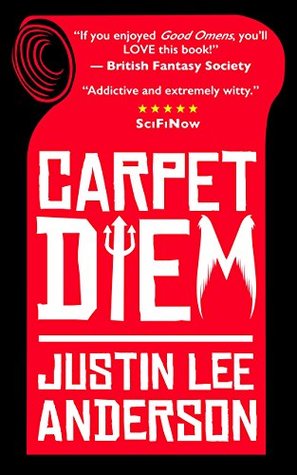
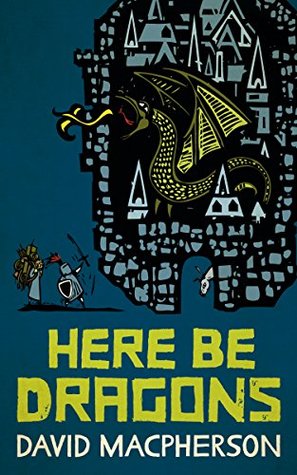
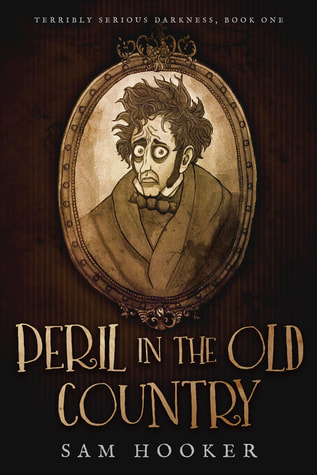
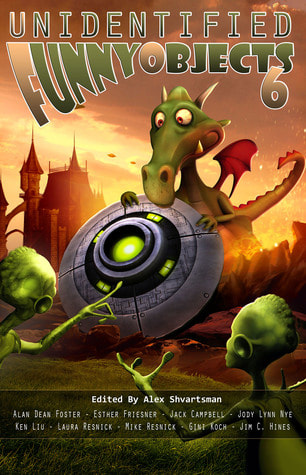
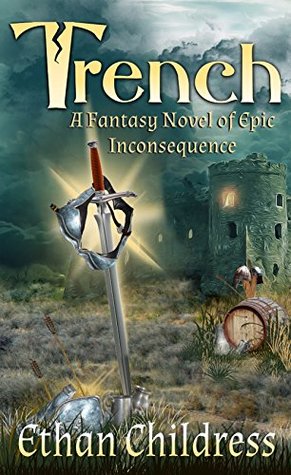
 RSS Feed
RSS Feed
